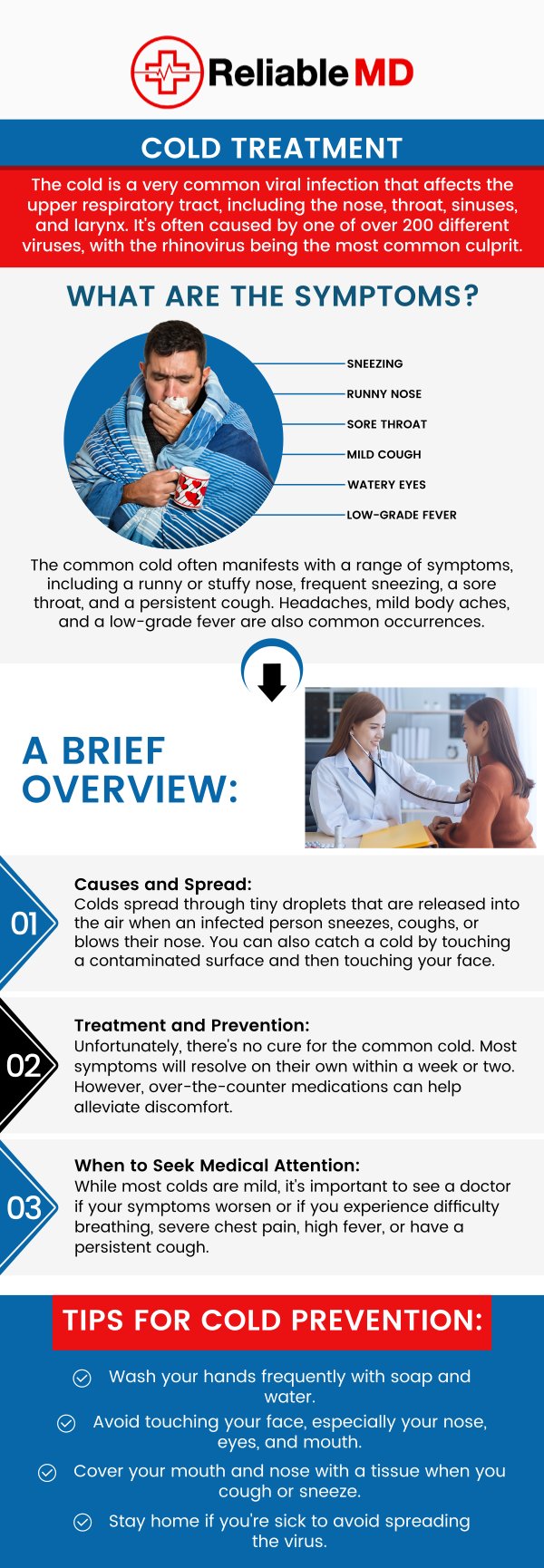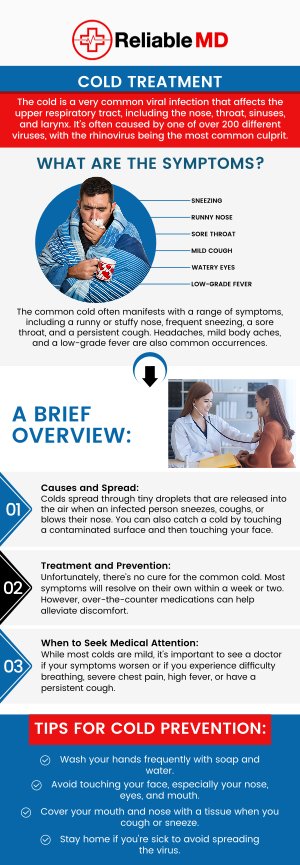Does Blowing Your Nose Make Cold Symptoms Worse?
Blowing your nose when you have a cold can provide temporary relief, but may also worsen symptoms in some cases. Forceful blowing can lead to further irritation, increased inflammation, and pressure buildup, making congestion worse. At Reliable MD, our professional team can provide guidance on managing cold symptoms effectively. For more information, contact us or schedule an appointment online. We are conveniently located at 2801 Fruitville Rd Unit 140, Sarasota, FL 34237.


Table of Contents:
Does blowing your nose help get rid of a cold faster?
Is it better to let your nose run when you have a cold?
What are the stages of most colds, and how long does each stage last?
Does excessive nose-blowing lead to more irritation or discomfort?
At Reliable MD, we understand that dealing with a cold can be uncomfortable, and many patients wonder if blowing their nose will help them recover faster. Blowing your nose can help relieve some of the symptoms of a cold, but it doesn’t necessarily speed up the recovery process. Clearing mucus from your nasal passages can provide temporary relief from congestion and make it easier to breathe. However, blowing your nose too forcefully can sometimes lead to irritation in the nasal passages, causing discomfort or even pushing mucus deeper into the sinuses, which may prolong symptoms.
The body typically takes its time to fight off the cold virus, and blowing your nose too frequently won’t change that. The most important thing is to manage your symptoms with gentle nose blowing, rest, hydration, and possibly using over-the-counter remedies like saline nasal sprays to help loosen mucus. If your symptoms last longer than expected or worsen, it’s a good idea to seek medical advice to rule out complications such as sinus infections.
We recommend focusing on rest, staying well-hydrated, and managing your symptoms for the best recovery. Dehydration can worsen symptoms, so it’s important to drink plenty of fluids. Staying comfortable and keeping your environment calm can also help alleviate symptoms. If you have any concerns or need further advice, we’re here to guide you through your recovery process.
At Reliable MD, we often see patients who are concerned about runny noses, especially during cold and flu season. Letting your nose run when you have a cold can be beneficial in certain situations. The mucus your nose produces during a cold helps to trap and clear out viruses, bacteria, and other irritants from your nasal passages. By allowing your nose to run naturally, you give your body the chance to flush out these particles, which can potentially shorten the duration of your cold.
However, an excessive runny nose can lead to discomfort, so it’s important to manage it appropriately. Using a tissue to gently wipe your nose or blowing it softly when necessary can help prevent skin irritation. If the mucus becomes thick or persistent, or if you experience significant discomfort, over-the-counter saline nasal sprays or a humidifier can help thin the mucus and ease congestion. Always pay attention to how your body responds and consult with a healthcare professional if symptoms worsen or persist.
At Reliable MD, your health and comfort are important to us. If you’re unsure about your symptoms or need advice on managing a runny nose, our experienced team is here to provide trusted, compassionate care every step of the way. We understand how discomfort can impact your daily life, and we strive to offer personalized guidance and support to help you feel better. Our goal is to help you navigate your symptoms and find effective solutions for a quicker recovery.
We understand how disruptive a common cold can be to your daily life. Knowing the typical stages of a cold can help you monitor your symptoms and decide when to seek medical advice.
• Incubation Period:
After exposure to a cold virus, symptoms typically don’t appear immediately. This incubation period usually lasts from one to three days, during which the virus multiplies in your body, though you may not feel sick yet. If you suspect exposure and have underlying health conditions, seeking early guidance can help maintain your health.
• Symptom Onset:
Early symptoms like a scratchy or sore throat, mild fatigue, and sometimes a runny or stuffy nose usually appear in this stage. It typically lasts one to two days. If you’re uncertain whether it’s a cold, allergies, or another condition, seeking professional advice can help determine the cause and guide appropriate care.
• Peak Stage:
During the peak of the cold, symptoms intensify with more noticeable nasal congestion, sneezing, coughing, and occasionally a low-grade fever. This phase usually lasts two to three days. If symptoms worsen or become difficult to manage, seeking care can ensure proper support and guidance.
• Recovery Stage:
After the peak, symptoms gradually improve during the recovery stage, which can last another two to four days. Most people recover within seven to ten days, though a mild cough or congestion may persist for up to two weeks. If symptoms last longer or if you have underlying respiratory concerns, it’s important to evaluate your condition to rule out complications.
Every patient’s experience with a cold can differ based on their immune system, the specific virus involved, and other health factors. At Reliable MD, we’re committed to providing you with personalized guidance and support throughout every stage of your illness, including essential immunization and vaccination services. We help ensure you stay protected from preventable diseases, offering comprehensive care to help you manage your health effectively.
Excessive nose-blowing can indeed lead to increased irritation and discomfort. When you blow your nose too forcefully, it can cause the delicate skin inside your nostrils to become irritated, leading to soreness and redness. This constant friction can also damage the small blood vessels in your nasal passages, causing nosebleeds or making any existing congestion worse.
In addition to physical irritation, excessive blowing can worsen sinus pressure and congestion. When you blow your nose too often, it may not fully clear the nasal passages, causing mucus to get trapped in the sinuses. This can lead to increased inflammation and discomfort, prolonging the feeling of a stuffy nose or even leading to sinus infections in some cases. It’s important to blow your nose gently and avoid doing it repeatedly to minimize these risks.
At Reliable MD, our healthcare providers are here to offer guidance and ensure your symptoms are properly managed. Your comfort and well-being are our top priorities, and we are committed to providing the best care to address nasal congestion and related symptoms. For more information, contact us or schedule an appointment online. We are conveniently located at 2801 Fruitville Rd Unit 140, Sarasota, FL 34237. We serve patients in Sarasota County on Fruitville Rd, which is close to Whitfield Ave, Bee Ridge Rd, Lockwood Ridge Rd, and beyond! We also provide telehealth services, serving the entire state of Florida.

Check Out Our 5 Star Reviews


Additional Services You May Need








